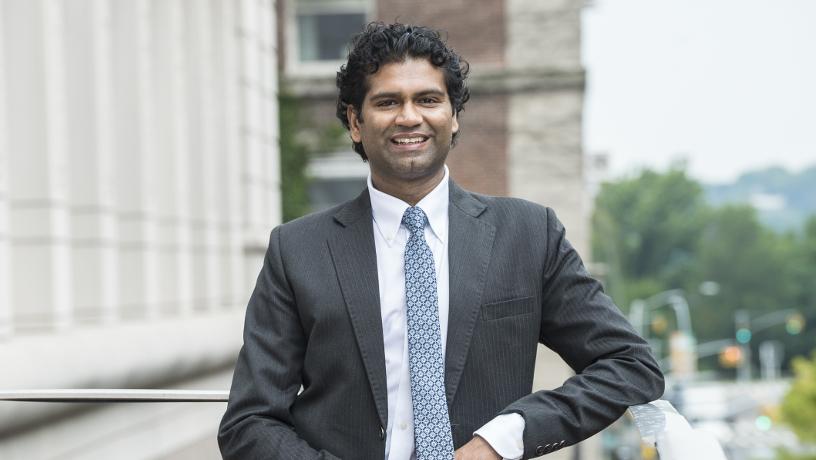AI With a Better IQ

As CEO and founder of Text IQ, Apoorv Agarwal MS’08, PhD’14 turned his doctoral thesis into a company that helps corporations ferret out sensitive information.
Suppose you’ve been hired to read through thousands of corporate emails, looking for conversations that indicate problematic situations such as fraud or sexual harassment. You come across this from Mike to Sara: “Had lunch with John. He liked his Reuben sandwich today. You should get it ASAP.” It sounds innocent, so you put it in the chaff file and keep looking for wheat.
You might have paused, though, if you had an understanding of all the company’s personnel— their roles and relationships. Then you would have recalled that a man named John Smith is a notetaker for the corporation’s board of directors who overhears privileged information and that he and Mike are friends. Some additional detective work would have revealed that “Reuben” is a code word for the company stock and that Mike, Sara, and John are engaging in insider trading.
But knowing every employee’s name, let alone having an understanding of the social networks in a large company, would be challenging even for the CEO. “It’s very difficult for a human to look at a document out of context and determine whether or not it’s sensitive,” says Apoorv Agarwal MS’08, PhD’14.
Agarwal is the CEO and cofounder of Text IQ, a startup that uses artificial intelligence and machine learning to do what those human workers are trying to do—but better—for government agencies and highly regulated enterprises. Text IQ, which made 2018’s AI 100 list, was created on the heels of Agarwal’s thesis project, in which he built software that could scan novels—classics such as Jane Austen’s Emma and Lewis Carroll’s Alice’s Adventures in Wonderland—and diagram characters’ roles, relationships, and interactions with one another.
After Agarwal graduated in 2014, officials with the National Science Foundation who had long supported his graduate work told him they saw commercial potential in the software—a 2016 survey of 100 firms storing an average of 20 terabytes found only 37% regularly audited the amount of data employees produced—and coached him and his fellow cofounder, Omar Haroun JD/MBA’12, in how to approach and talk to potential customers. Their first customers were legal teams at large enterprises, which often hire thousands of people to review emails and other documents before the discovery phase of a lawsuit to find data that is shielded by attorney-client privilege.
In addition to those risk-management scenarios, Text IQ can also help companies comply with new consumer privacy regulations such as Europe’s General Data Protection Regulation. In European countries, “now people have the right to ask Facebook or Google, ‘What data do you have on me, and could you please delete it or not use it for these marketing purposes?’” says Agarwal.
Apoorv has created a tone at the top of the company that ensures that Text IQ’s technology will be used responsibly.
But technical prowess in natural language processing and machine learning isn’t all it takes to create a great AI company, according to Agarwal. The soft skills he picked up at Columbia have also served him well. Kathy McKeown, Henry and Gertrude Rothschild Professor of Computer Science, for instance, modeled the importance of marrying ideals with action. “Kathy’s a visionary, but she also has the ability to build a team to bring that vision to reality,” he says. “That’s a skill that I now use daily in my role as CEO.”
And Rocco Servedio, professor and chair of computer science, who teaches a graduate course in Computational Learning Theory, illustrated how to communicate dense, technical knowledge to nonexperts. “The skill of translating complex ideas in simple terms requires breaking a complex thought into smaller pieces, explaining the pieces, and then tying it all together,” Agarwal explains. “Rocco was an exceptional teacher in that way.” For his part, Servedio says he was impressed by how, as a graduate student, Agarwal was always wondering how “the theoretical material we were studying could be applied to real-world applications.”
But one of the biggest takeaways Agarwal carried from the classroom to the boardroom was the idea that artificial intelligence programs must be designed with ethical considerations in mind so that, for instance, they do not inadvertently discriminate against groups of people. “Apoorv has created a tone at the top of the company that ensures that Text IQ’s technology will be used responsibly,” says Marla Persky, an attorney who has served as general counsel for several large corporations and is an adviser to Text IQ.
Indeed, during the frequent talks Agarwal gives on AI, he takes a moment to reassure audience members that, even as AI helps people work smarter, it doesn’t pose an existential threat. He believes computers would have to develop self-consciousness in order to be able to think independently, and, since humans had to evolve to become self-conscious, computer experts would have to simulate evolution to make their machines self-conscious.
That would require, at minimum, vast amounts of computing power that doesn’t even exist right now, he says. “The kind of machine learning we currently do, for the most part, simply detects patterns in vast amounts of data. That isn’t the path to creating self-conscious machines. We’re still in control of what machines can do.”
